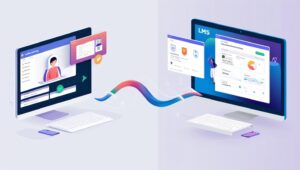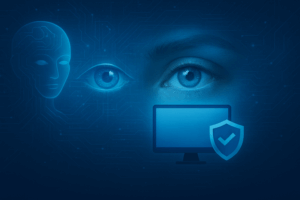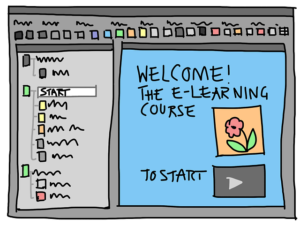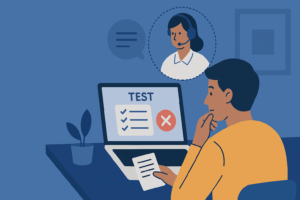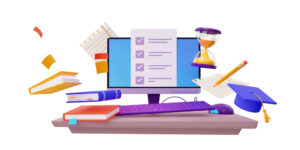Online proctored tests have become increasingly popular recently, especially since the COVID-19 pandemic hit the world. Online exam takers can now take exams from the comfort of their homes, using their computers and webcams to ensure they are monitored during the test. However, online proctored tests come with their own set of challenges and unique requirements that must be considered to succeed. This blog post will explore expert tips and strategies for mastering Live online proctored exams.

Understanding Online Proctoring
Online proctoring is a technology that enables a remote proctor to supervise an exam in real-time using audio and video feeds. The remote proctor can watch the online test-takers and their computer screen to ensure they are not cheating, while the test-taker can communicate with the proctor using a chat window. Online proctoring is commonly useful for remote exams, such as certification exams, high-stakes online tests, and university entrance exams.
Expert Tips for Online Test-taking
Prepare your environment: Before taking an online proctored test, ensure a quiet, distraction-free environment. Ensure the room is well-lit and no one else is with you. You should also remove any materials not allowed during the online exams, such as notes or textbooks.
Test your equipment: It is important to test your computer and webcam before taking an online proctored test. Ensure that your computer meets the minimum requirements for the online testing software and that your webcam is functioning properly. You should also test your internet connection to ensure it is stable and fast enough to support the testing software.
Familiarize yourself with the testing software: Review the testing software before the exam day. This includes understanding the software’s layout, navigating through it, and what features are available. Familiarizing yourself with the software will help avoid technical difficulties during online examinations.
Read the instructions carefully: Ensure you read and understand the instructions for the online exams. This includes the rules and regulations and any specific exam format or structure instructions.
Manage your time: Time management is crucial when taking an automated proctored exam. Make sure you allocate enough time for each exam section and pace yourself accordingly. You should also take breaks if needed, but be aware of the time limit for the exam.
Stay focused: It can be easy to get distracted when taking an online proctored exam, especially in a familiar environment. Ensure you stay focused on the online examinations and avoid distractions like social media or email notifications.
Be prepared for technical difficulties: Despite all the preparation, you may encounter technical problems during online exams. In case of technical issues, contact the support team immediately for assistance.
FAQs by Students for Online Proctored Tests

Q: What is an online proctored test?
A: An online proctored test is an exam under observation using the Internet with invigilation remotely by a proctor to ensure academic integrity.
Q: How does online proctoring work?
A: Online proctoring, such as Proctortrack, involves using software to monitor a student’s computer activity during the online test and video and audio feeds to observe the student taking the test in real time.
Q: What are the requirements for taking an online proctored test?
A: The requirements for taking an online proctored test can vary depending on the software and institution administering the test. However, common requirements may include a reliable internet connection, a webcam, a microphone, and a government-issued ID.
Q: Can I use scratch paper during an online proctored test?
A: It depends on the policies of the institution administering the test. Some institutions may allow scratch paper, while others may require you to use a virtual whiteboard within the online exam software.
Q: What if I experience technical difficulties during an online proctored test?
A: If you experience technical difficulties during an online proctored test, you should immediately contact the technical support team for the testing software. You should also inform your instructor or exam proctor as soon as possible.
Q: What happens if I am under suspicion of cheating during an online proctored test?
A: If you come under suspicion of cheating during an online proctored test, the proctor may flag your exam for further review by an academic or disciplinary committee. Depending on the severity of the infraction, you may receive a failing grade, academic penalty, or even expulsion from the institution.
Q: Can I take an online proctored test from a different location?
A: It depends on the policies of the institution administering the test. Some institutions may allow students to take online proctored tests from a different location. In contrast, others may require students to take the test from a specific location or under certain conditions.
Q: Can I use a calculator during an online proctored test?
A: It depends on the policies of the institution administering the test. Some institutions may allow calculators, while others may not. If a calculator is permissible, it may be available within the testing software. Students may need a physical calculator with a pointed camera during the test.
Q: What should I do if I have concerns about online proctoring?
A: If you have concerns about online proctoring, you should speak with your instructor or exam proctor to address your concerns. Consider consulting with your academic advisor or student support services for additional guidance. Online proctoring service providers like Proctortrack offer 24*7 customer support.
Conclusion
Taking an online proctored test can be a challenging experience, but with the right preparation, strategies, and best online test takers, you can increase your chances of success. The expert tips above will help you master the online proctored test and achieve your goals. Remember to prepare your environment, test your equipment, familiarize yourself with the testing software, read the instructions carefully, manage your time, keep focus, and do enough preparation for technical difficulties. Good luck with your online proctored test!

